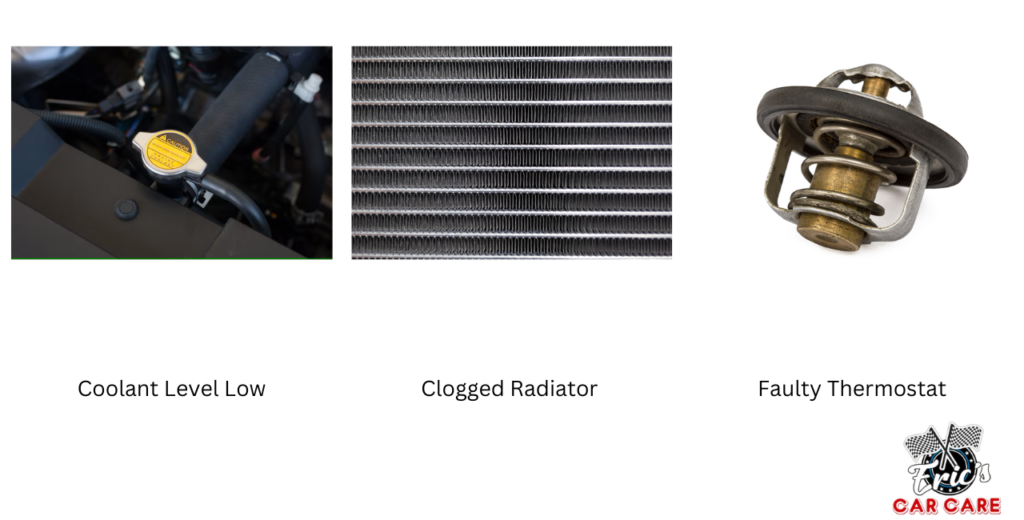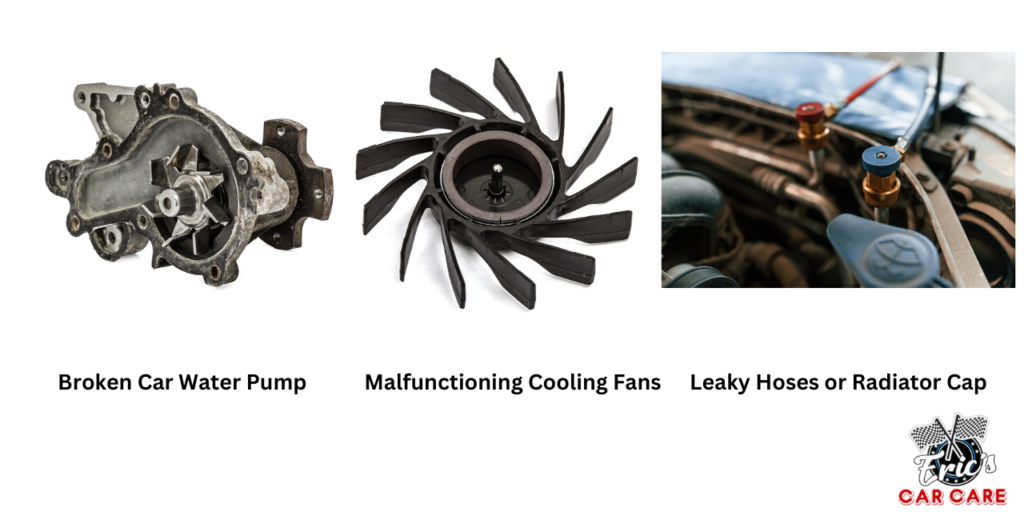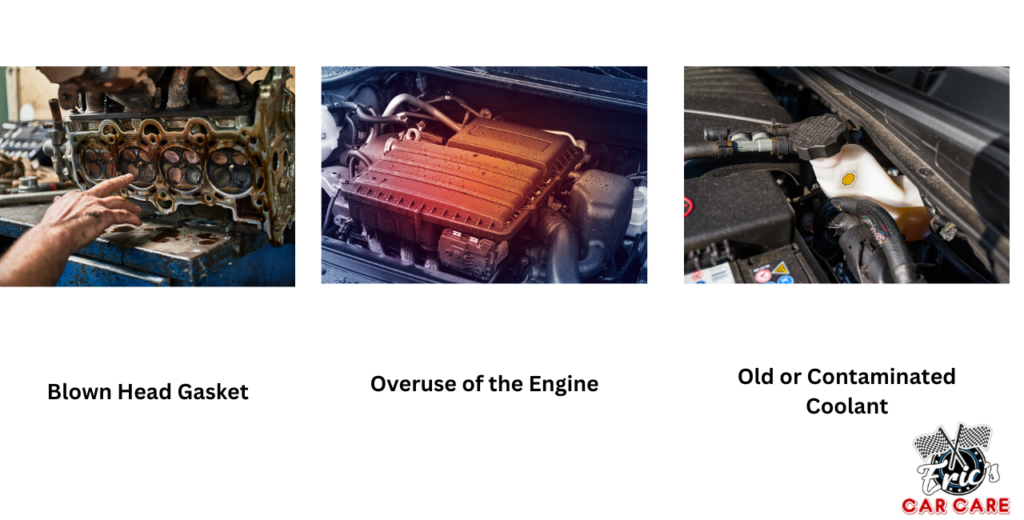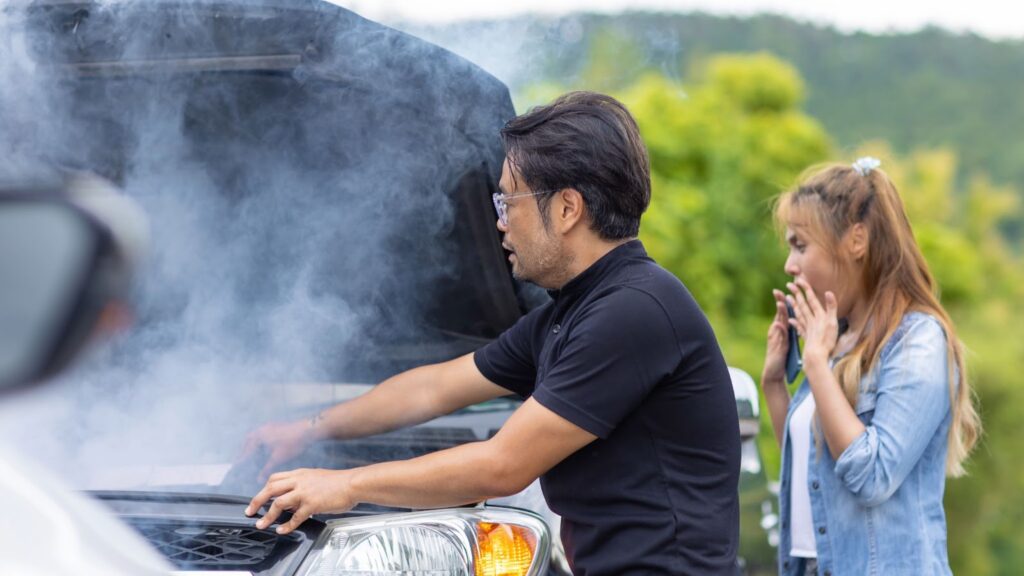Overheating engines are a serious concern for vehicle owners. In this blog, we’ll explore the common causes of engine overheating, its symptoms, and the best ways to prevent and fix the problem with expert engine repair services at your trusted auto repair Houston, to keep your vehicle running smoothly.
If you’re searching for ‘auto repair near me,’ we’re here to help — book your service today.
What Causes an Engine to Overheat?
Several issues can cause an engine to overheat. Understanding these factors can help you take preventive measures before they lead to costly repairs.
Low Coolant Level
Coolant plays a vital role in maintaining the engine’s temperature by absorbing excess heat and dissipating it through the radiator. If the coolant levels are low, the engine will struggle to regulate its temperature, which can lead to overheating. Low coolant levels can occur due to a slow leak in the system or improper coolant maintenance. Be sure to check your coolant levels regularly and top them off as needed to prevent the engine from overheating.
Radiator Problems
The radiator works by circulating coolant through a series of channels to dissipate the heat absorbed by the engine. If the radiator is clogged, damaged, or corroded, it won’t function effectively, causing the engine to overheat. Over time, debris, dirt, and mineral buildup can restrict airflow through the radiator, reducing its efficiency. Regular radiator checks and cleaning will help ensure it remains in optimal condition, allowing for proper heat dissipation.
Faulty Thermostat
The thermostat is a key component that controls the flow of coolant through the engine. When the engine reaches a certain temperature, the thermostat opens to allow coolant to circulate. If the thermostat gets stuck in the closed position, it will prevent coolant from flowing to the engine, causing the engine temperature to rise. A malfunctioning thermostat should be replaced immediately to prevent engine overheating and possible damage to the engine block.

Broken Car Water Pump
The water pump is responsible for circulating coolant through the engine and radiator. If the pump is worn out or broken, coolant won’t circulate as needed, and the engine can overheat. Over time, seals within the water pump can wear out, leading to coolant leaks and reduced circulation. Regular inspection of the water pump can help detect early signs of failure, preventing an overheating issue that could result in significant engine damage.
Malfunctioning Cooling Fans
Cooling fans help reduce the engine temperature by blowing air through the radiator. If these fans stop working due to a faulty motor, broken fan blades, or electrical issues, the engine won’t receive adequate airflow. In hot weather or while driving in traffic, the lack of cooling fan operation can lead to engine overheating. Regular maintenance of the cooling fans and their components ensures they perform properly, especially in heavy driving conditions.
Leaky Hoses or Radiator Cap
Leaks in the radiator hoses or the radiator cap can allow coolant to escape, leading to insufficient coolant levels in the system. A damaged hose can develop cracks or splits that cause slow leaks, and a faulty radiator cap can fail to maintain the proper pressure, leading to coolant loss. It’s essential to regularly inspect the hoses for signs of wear and ensure that the radiator cap is working properly to avoid coolant leaks that could lead to overheating.

Blown Head Gasket
A blown head gasket is a severe engine issue that can result from excessive heat. The head gasket seals the engine block and cylinder head, preventing coolant and oil from mixing. When a head gasket blows, coolant may leak into the engine, causing a drop in coolant levels and overheating. You may also notice white smoke from the exhaust or milky oil. A blown head gasket should be repaired immediately, as it can lead to catastrophic engine failure if not addressed.
Overuse of the Engine
Using the engine excessively, such as towing heavy loads or driving for long hours in extreme heat, puts additional stress on the engine. This added strain can prevent the cooling system from keeping up with the heat being generated, resulting in overheating. If you often tow heavy loads or drive in harsh conditions, ensure that your cooling system is in top shape, and consider additional cooling options to help manage engine temperature.
Old or Contaminated Coolant
Coolant deteriorates over time due to exposure to high temperatures, contaminants, and oxidation. Old coolant may not be as effective at transferring heat, and contaminated coolant can cause blockages in the cooling system, leading to overheating. It’s important to flush the cooling system and replace the coolant at regular intervals as recommended by your vehicle manufacturer to maintain efficient engine cooling and prevent overheating.

Symptoms of an Overheating Engine
Watch out for these signs that your engine may be overheating:
1. Temperature Gauge in the Red Zone
The temperature gauge is one of the easiest indicators of overheating. If the needle moves into the red zone, this means the engine has reached a dangerous temperature. It’s crucial to pull over and turn off the engine immediately to prevent further damage.
2. Warning Lights
Many modern vehicles are equipped with a check engine light or temperature warning light that activates when the engine is overheating. If you see one of these lights on the dashboard, it’s a clear signal that your engine’s temperature is too high, and you should stop driving as soon as possible.
3. Steam or Smoke
Steam or smoke coming from the hood of your car is one of the most obvious signs of engine overheating. This occurs when the coolant or engine oil heats up and begins to evaporate or burn. Don’t open the hood immediately—wait for the engine to cool down before inspecting the area.
4. Unusual Smells
If you detect a burnt or sweet odor coming from your engine, it may be a sign that your engine is overheating. A burnt smell could indicate overheating engine oil, while a sweet smell is often linked to coolant leaking from the engine.
5. Engine Performance Issues
When the engine overheats, you may notice a drop in performance, such as sluggish acceleration, engine sputtering, or difficulty maintaining speed. These performance issues are a result of the engine struggling to operate under extreme heat conditions, and continued driving can cause further damage.
What Happens if Your Engine Overheats?
If left unchecked, engine overheating can lead to severe damage, including:
- Warped Cylinder Heads: The excessive heat can warp the cylinder heads, which results in loss of compression and engine misfires. In severe cases, the cylinder head can crack, requiring costly repairs.
- Cracked Engine Block: High engine temperatures can cause the engine block to crack, which may result in coolant leaks and severe engine damage. Cracked engine blocks often lead to a complete engine failure.
- Blown Head Gasket: A blown head gasket may cause coolant and oil to mix, leading to engine malfunction. This issue can lead to catastrophic engine damage if not addressed immediately.
How to Prevent Engine Overheating
Prevent overheating by maintaining your vehicle’s cooling system:
- Check Coolant Levels: Regularly top up coolant to avoid low levels. Always use the recommended coolant type for your vehicle.
- Inspect Radiator and Hoses: Keep the radiator clean and free of debris. Inspect hoses for cracks and leaks, replacing them when necessary.
- Change the Coolant: Flush and replace coolant at the intervals recommended by your car’s maintenance schedule. Using fresh coolant ensures proper engine temperature regulation.
- Maintain the Thermostat and Water Pump: Ensure both components are functioning properly to ensure efficient coolant flow and temperature regulation.
- Monitor Cooling Fans: Make sure cooling fans are working effectively, especially during hot weather or heavy traffic driving.
- Avoid Overloading: Don’t overwork the engine by towing excessive weight or driving for extended periods in extreme conditions.
What to Do if Your Engine Overheats?
If your engine begins to overheat:
- Pull Over Safely: Stop driving immediately to prevent further damage. Move to a safe location and turn off the engine.
- Allow the Engine to Cool: Let the engine cool down for at least 15-20 minutes before attempting to open the hood or inspect it.
- Check Coolant Levels: After the engine cools, check the coolant reservoir to see if coolant levels are low. Top up if necessary.
- Call for Help: If you are unable to resolve the issue or detect a more serious problem, call for roadside assistance or a tow to a trusted mechanic.
Get Expert Help at Eric’s Car Care
If your engine is overheating or you’re facing any engine issues, Eric’s Car Care is here to help. Our expert technicians specialize in diagnosing and fixing engine problems, including cooling system repairs, radiator issues, and more. We offer reliable, affordable services designed to get your vehicle back on the road safely.
Contact us today for professional engine repair services! Let us keep your car in top condition and avoid costly engine damage.

